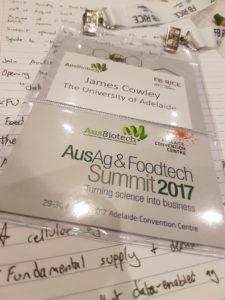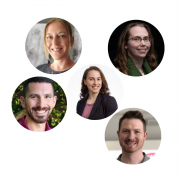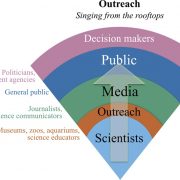Turning science into business: how to use your gift of gab and communicate with industry
I am a PhD Student at the University of Adelaide in South Australia with a background in agricultural science and molecular biology. My PhD project focusses on seed coat mucilage biosynthesis in the genus Plantago for applications in food technology. I also have a passion for citizen science, science communication and science literacy particularly in agriculture and biotechnology. I also tweet at @jamesmcowley.

Growing up I was incredibly jealous of people who were lucky enough to be born with the ‘gift of gab’—the ability to talk to anyone and everyone about anything and everything. Not having the gift, I struggled with confidence and communication—skills essential for any career, but particularly one in science. Early in my research career, I actively sought to cultivate my “gift of gab” by engaging in extensive community outreach for the University of Adelaide. Not only did this experience give me invaluable communication skills, but also showed me that I can sell science, I can sell the University and most importantly, I can sell myself and my research. I found that the ‘gift of gab’ is something that can be learnt and I have since become passionate about pursuing a science career with emphasis on science communication and business where I can use it best.
 Fast-forward to now, 2017, and my passion for SciComm led me to attend the AusAg and Foodtech Summit held at the Adelaide Convention Centre. The conference was organised by AusBiotech to promote the translation of Australian science into business. This summit focused on investment into technological innovations in the agriculture and food industries, making it ideal for those looking to make the transition to industry in the future.
Fast-forward to now, 2017, and my passion for SciComm led me to attend the AusAg and Foodtech Summit held at the Adelaide Convention Centre. The conference was organised by AusBiotech to promote the translation of Australian science into business. This summit focused on investment into technological innovations in the agriculture and food industries, making it ideal for those looking to make the transition to industry in the future.
The structure of the conference was unique but ideal for demonstrating each of the key steps involved in investing in science and technology, focussing on the ‘themes’ of The Investors, The Customers, The Creators, and The Framework. As such, it catered for both science- and business-minded attendees. ‘The Investors’ and ‘The Customers’ themes were most relevant to scientists new to industry and raised some important points.
The Investors
‘The Investors’ theme was tailored to scientists who have yet to branch out into business or industry; essentially, it provided a crash course in capital investment. A panel of investment experts were grilled with questions by moderators and attendees with particular focus on ‘what does and doesn’t draw the attention of potential investors’.
Certainly, the most significant discussion was regarding dishonesty in science. Dr Andrew Kelly, the executive director of BioPacific Partners claimed boldly that “scientists lie,” by which he meant that eager scientists sometimes falsify scientific and technological advances, leading to distrust and failure of a product. While the panel agreed that this may sometimes be the case, the claim was quickly rebutted by Phil Morle, a venture capitalist from Main Sequence Ventures, who stated that “scientists don’t lie enough”. The statement was met with amusement from attendees but Morle clarified that venture capitalists and investors are looking for impact; they are “looking for big things” and if scientists are looking at their innovation from a ‘blue sky’ perspective, it is already “too small”. No matter how fundamental to the problem, your innovation must be portrayed to investors as the solution, even if it’s through embellishment. Morle continued to explain that if scientists ‘lied more’ they could “start a movement”, cultivating interest through passion and through “relentless execution and resilience”. Cultivating interest in this way can backfire if the product does meet claims, but can lead to much greater success and accelerated development. The benefits of getting a game-changing product to market sooner can outweigh the risks of failure. In essence, scientists must have supreme confidence in their innovation, and themselves as the driving force behind it, in order to navigate the initial stages of investment in science and technology.
The Customers
The second theme, ‘The Customers’, focussed on advancing technologies from the initial investment stage to a point where large agritech and foodtech companies are interested in seeking collaborations and licensing. The panel was comprised of R&D and general managers who spoke of the type of technologies that have they have successfully developed partnerships with, and denoted the key traits a company and its people must have to forge these types of partnerships. Above all, the panel was unanimous when stating that at this point in the investment process, the technology speaks for itself and is somewhat immaterial, and instead the people behind it are key to the success of the partnership. Large companies want to invest in “good people, good humans who understand and believe in their product”, and when scientists take a large, communicative role in a partnership it gives investors confidence in the technology. It is imperative that the scientists who are developing the technology are visible, professional and personable throughout the investment process in order to fuel wider success.
 At the 2017 AusAg and Foodtech Summit, it was clear that business ventures and industry careers are well within reach of all scientists, but it’s all about communication. It’s essential that the scientists—the creators—are active in all stages of investment as this is paramount to success and advancement of innovation. Investors want to invest in “good people, good humans who believe in their product” and usually these people are the scientists who created it and understand it. Some scientists may not see industry as an option as they are not business-minded, but when giving a seminar of our research, we are selling ourselves. Perhaps being science-minded and being business-minded aren’t so different, so if you are passionate about your scientific field, and your innovation and believe it can make a change, it all begins with using your ‘gift of gab’ and starting a conversation with the right person.
At the 2017 AusAg and Foodtech Summit, it was clear that business ventures and industry careers are well within reach of all scientists, but it’s all about communication. It’s essential that the scientists—the creators—are active in all stages of investment as this is paramount to success and advancement of innovation. Investors want to invest in “good people, good humans who believe in their product” and usually these people are the scientists who created it and understand it. Some scientists may not see industry as an option as they are not business-minded, but when giving a seminar of our research, we are selling ourselves. Perhaps being science-minded and being business-minded aren’t so different, so if you are passionate about your scientific field, and your innovation and believe it can make a change, it all begins with using your ‘gift of gab’ and starting a conversation with the right person.
Follow me on Twitter @jamesmcowley









